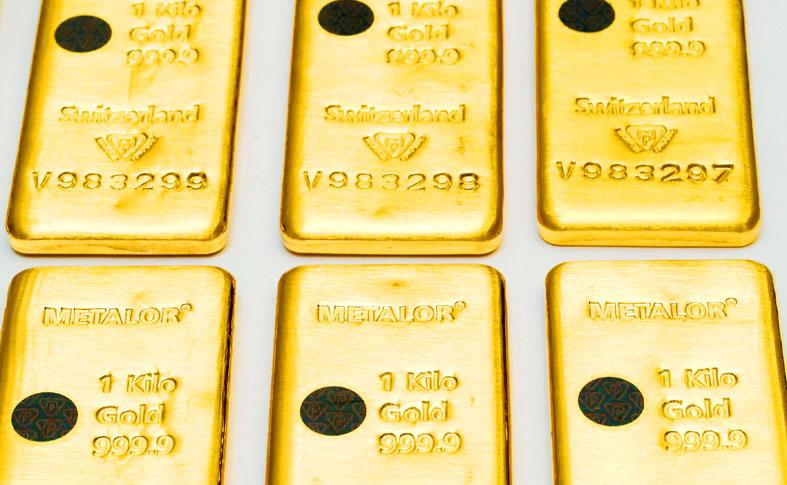Investors cut holdings in exchange-traded funds (ETFs) for silver, platinum and palladium in the second quarter on fears that a potential recession would reduce industrial demand, but gold assets held up because of its role as a haven, and that might persist.
Gold-backed ETFs shrank by just more than 1 percent in the three months through last month, after an 8 percent surge in the first quarter helped by Russia’s invasion of Ukraine, data compiled by Bloomberg sowed.
By contrast, silver holdings contracted almost 5 percent, and the outflow in tonnage terms was the biggest since 2011.

Photo: Reuters
The amount in gold ETFs is the lowest since March, while assets in the other three precious metals are around the smallest since 2020.
Gold has held up well relative to silver and platinum. One ounce of gold now buys 90 ounces of silver, the most in almost two years.
The resilience of gold offers yet more evidence to support its role as a component in portfolio asset allocation, in contrast to silver, platinum and palladium, which have more industrial uses and are therefore more exposed to economic downturns, ETF Securities senior business development manager Chad Hitzeman said.
“Where broader markets remain negative, pressured by inflation and central bank hawkishness in taming prices, we see investors holding fast to gold ETFs as a risk-off haven,” said Hitzeman, whose company offers several precious metals products to investors.
Giovanni Staunovo, a strategist at UBS Group AG’s wealth management unit, shared this sentiment.
“If market recession fears are increasing, you prefer to hold exposure to gold and not to the white metals, which have a high industrial usage,” he said.
Gold for August delivery fell US$5.80 to US$1,801.50 an ounce on Friday, down 1.57 percent from a week earlier.
Silver for September delivery fell US$0.68 to US$19.67 an ounce, plunging 6.9 percent weekly, while September copper fell US$0.11 to US$3.60 a pound, posting a weekly decline of 3.74 percent.
Additional reporting by AP

Among the rows of vibrators, rubber torsos and leather harnesses at a Chinese sex toys exhibition in Shanghai this weekend, the beginnings of an artificial intelligence (AI)-driven shift in the industry quietly pulsed. China manufactures about 70 percent of the world’s sex toys, most of it the “hardware” on display at the fair — whether that be technicolor tentacled dildos or hyper-realistic personalized silicone dolls. Yet smart toys have been rising in popularity for some time. Many major European and US brands already offer tech-enhanced products that can enable long-distance love, monitor well-being and even bring people one step closer to

Malaysia’s leader yesterday announced plans to build a massive semiconductor design park, aiming to boost the Southeast Asian nation’s role in the global chip industry. A prominent player in the semiconductor industry for decades, Malaysia accounts for an estimated 13 percent of global back-end manufacturing, according to German tech giant Bosch. Now it wants to go beyond production and emerge as a chip design powerhouse too, Malaysian Prime Minister Anwar Ibrahim said. “I am pleased to announce the largest IC (integrated circuit) Design Park in Southeast Asia, that will house world-class anchor tenants and collaborate with global companies such as Arm [Holdings PLC],”

Sales in the retail, and food and beverage sectors last month continued to rise, increasing 0.7 percent and 13.6 percent respectively from a year earlier, setting record highs for the month of March, the Ministry of Economic Affairs said yesterday. Sales in the wholesale sector also grew last month by 4.6 annually, mainly due to the business opportunities for emerging applications related to artificial intelligence (AI) and high-performance computing technologies, the ministry said in a report. The ministry forecast that retail, and food and beverage sales this month would retain their growth momentum as the former would benefit from Tomb Sweeping Day

Thousands of parents in Singapore are furious after a Cordlife Group Ltd (康盛人生集團), a major operator of cord blood banks in Asia, irreparably damaged their children’s samples through improper handling, with some now pursuing legal action. The ongoing case, one of the worst to hit the largely untested industry, has renewed concerns over companies marketing themselves to anxious parents with mostly unproven assurances. This has implications across the region, given Cordlife’s operations in Hong Kong, Macau, Indonesia, the Philippines and India. The parents paid for years to have their infants’ cord blood stored, with the understanding that the stem cells they contained